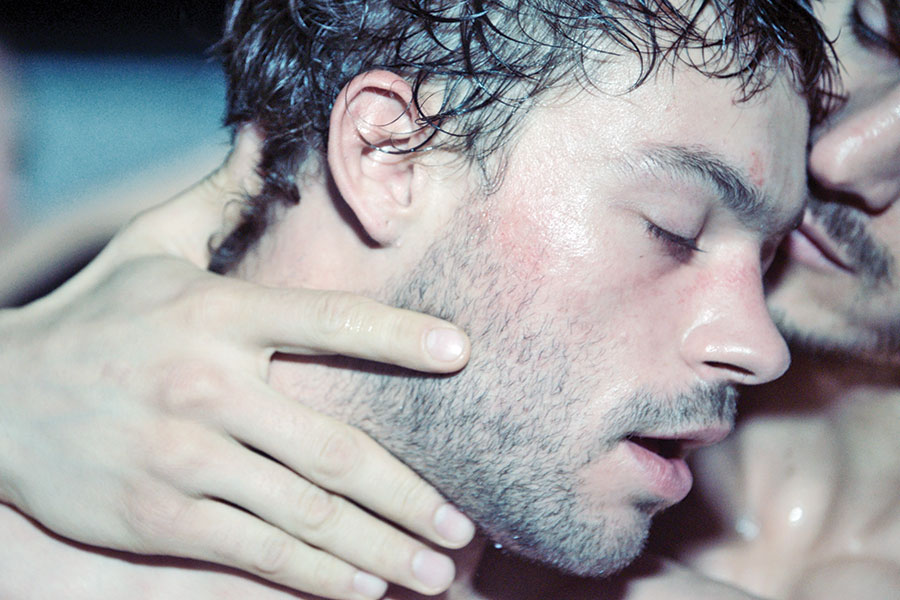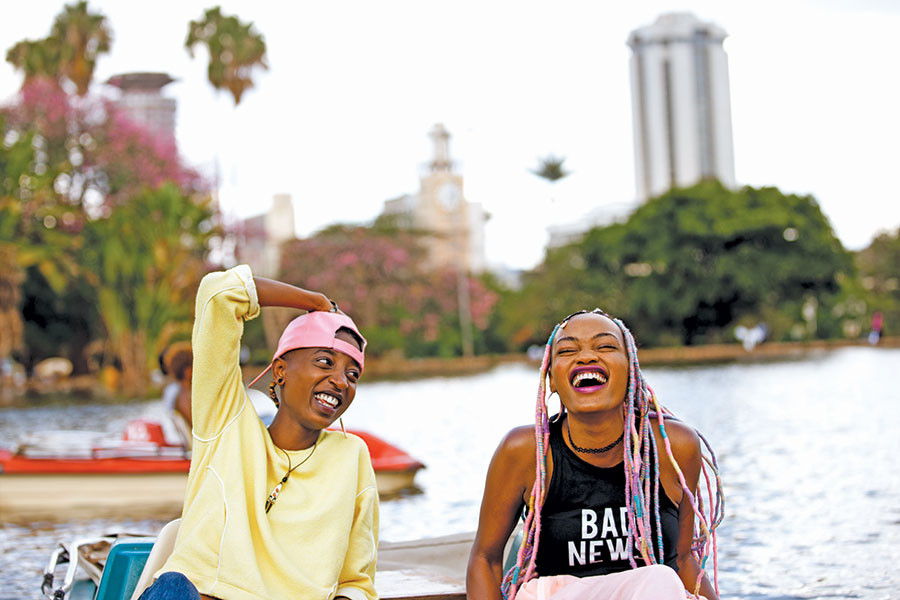
This year’s Philadelphia Film Festival will provide a sneak peek at five movies with queer content, a month before those films debut.
The festival, screening Oct. 18-28 at multiple city venues, will open with the Philadelphia premiere of “Ben Is Back,” a family drama starring Julia Roberts and Lucas Hedges (“Boy Erased”), and will wrap up with the documentary “Teddy Pendergrass: If You Don’t Know Me.” In between, more than 100 shorts, features and documentaries will debut.
“Boy Erased,” written and directed by Joel Edgerton and based on Garrard Conley’s memoir, is an important drama about teenager Jared (Lucas Hedges) being sent to a gay-conversion program by his parents, Marshall (Russell Crowe), a Baptist preacher, and Nancy (Nicole Kidman). The film certainly depicts the horrors of Jared’s experiences. Yet, despite that it’s his story, the script seems to be more focused on educating and changing the minds of parents of LGBT youth, which may disappoint queer viewers looking for identification.
“Can You Ever Forgive Me?” is a hilarious comedy-drama that features Melissa McCarthy in a serious role. She plays Lee Israel, a down-on-her-luck lesbian who has contempt for just about everyone. She can’t seem to hold a job or make ends meet, but she unexpectedly stumbles upon a scheme to forge famous people’s letters for cash. She confesses her crime to her gay drinking buddy, Jack Hock (Richard E. Grant), whom she enlists to help with her scams. The rapport between Lee and Jack is often pricelessly funny, but the film is cloaked in a sadness that is ultimately quite moving.
Matt Tyrnauer’s lively documentary, “Studio 54,” takes viewers behind the velvet ropes and into the famed New York City nightclub. With hundreds of amazing photographs, film clips, news footage and interviews, Tyrnauer gets Ian Schrager — who co-owned the club with the late, gay Steve Rubell and a silent partner named Jack Dushey — to “tell the story as it really happened,” nearly 40 years later.
“El Angel” from Argentina is a flinty true-crime film about Carlos (Lorenzo Ferro), a teenager in 1971 Buenos Aires who commits a handful of robberies with Ramón (Chino Darín), a classmate to whom he’s attracted. There is a palpable homoerotic tension between the two young friends. Eventually, Carlos becomes more desperate and more violent. It’s almost a spoiler to reveal that he became the longest-serving criminal in the country’s history. Director Luis Ortega’s stylish film features gorgeous period details and music, as well a knockout performance by Ferro.
Alas, the highly anticipated “If Beale Street Could Talk” — Barry Jenkins’ (“Moonlight”) adaptation of James Baldwin’s book — was not available for preview.
The terrific romance from Kenya, “Rafiki” (“Friend”), was outlawed in its home nation for “promoting lesbianism,” but this humble film really addresses homophobia. Kena (Samantha Mugatsia) is a tomboy who falls for Ziki (Sheila Munyiva) — which is unheard of in their town, where their fathers also are political rivals. The young women make a pact not to be “like everyone else;” they want to be “something real.” They talk and kiss and cuddle, but they have a spat while attending a sermon on same-sex marriage. When their relationship is discovered, things really come to a head. Can Kena and Ziki live openly, or even be together? It’s essential to see the marvelous “Rafiki” to find out.
“Anchor and Hope” also depicts a pressure-filled relationship between two women, Eva (Oona Chaplin) and Kat (Natalia Tena), who live on a houseboat. When Kat’s friend Roger (David Verdaguer) stays with them, he agrees to help Eva realize her dream of having a baby. How the threesome manage this development forms the basis for this gentle, engaging drama that boasts three strong central performances and a lovely supporting turn from Geraldine Chaplin (Oona’s real-life mom) as Eva’s wacky mother.
The Belgian Oscar entry, “Girl,” depicts trans teenager Lara (Victor Polster), who hopes to study ballet. She is trying to adjust to life with all of the anxieties teens experience, from peer pressure to sexual curiosity. Lara receives nothing but love from her father (Arieh Worthalter), who wants the best for her, but he worries that Lara isn’t eating and that she is having trouble adjusting as she transitions. Their relationship is inspiring, but it’s Lara’s discomfort with her body that forms the central focus of the film. Polster gives a delicate performance in a film that rings true, despite adding little nuance to trans cinema.
Another film featuring a trans character is “The Party’s Just Beginning,” writer, director and star Karen Gillen’s fresh feature debut. Liusaidh (Gillen) is a young woman in Inverness who is stuck in a dead-end job and drinking too much, taking too many drugs and having too much casual sex. She is, it is slowly revealed, recovering from the suicide of her gay best friend, Alister (Matthew Beard), who was in the process of becoming a woman named Alice/Ally. As Liusaidh is haunted by images of Alister, she slowly starts to get out of her funk when she meets Dale (out actor Lee Pace), a potential boyfriend. She also has a series of disarming chats with an elderly man who is trying to reach a suicide hotline, but calls Liusaidh instead. “The Party’s Just Beginning” balances poignancy and irreverence as it makes its points about acceptance and self-worth, and Gillen’s vibrant style and ingratiating performance make these messages go down smoothly.
The festival also offers two naughty French imports. “Sauvage” (“Wild”) is a fantastic drama about Léo (Félix Maritaud), a gay male prostitute. He is seen plying his trade with various customers when not taking drugs or sleeping wherever he can (often on the street itself). Léo is not well; he has a bad cough and he’s got it bad — that is, he’s in love with Ahd (Eric Bernard), a sexy gay-for-pay hustler pal who looks out for him but doesn’t love him back. “Sauvage” is mostly plotless as it follows Léo from an intense encounter with a couple of clients who hurt him to a touching visit with a female doctor (Marie Seux) who tries to help him. Maritaud gives a tremendous performance, capturing Léo’s palpable despair with his incredible body language. Writer-director Camille Vidal-Naquet shoots the cruising-area scenes like a nature documentary, but “Sauvage” is a raw and immersive experience.
Maritaud also has a supporting role in “Knife + Heart,” a cheeky thriller set in 1979 Paris. Anne Parèze (a delicious Vanessa Paradis), a producer of gay porn, is upset over her breakup with Lois (Kate Moran), a film editor at her studio. However, her real troubles begin when the actors in one of her films are being murdered one by one by a masked man wielding a dildo that doubles as a knife. Director-cowriter Yann Gonzalez’s stylish film is fabulous when it depicts Anne’s amour fou, or the cheesy gay-porn shoots that mimic Anne’s life — such as a police-station interrogation — but this clever film loses steam when it shifts to solving the mystery.
The Portuguese import “Diamantino” features gender-bending and genre-bending in equal measure. The title character (Carloto Cotta) is a soccer player who loses his mojo in the World Cup final. He decides to take in an African refugee, Rahim. However, Rahim is really a lesbian Secret Service agent named Aisha (Cleo Tavares), looking to investigate Diamantino’s questionable finances — much to her girlfriend Lucia’s (Vargas Maria Leite) dismay. This bonkers film features body-altering genetic procedures, evil twins, political satire and — cuteness overload! — giant, fluffy puppies. The parts may be greater than the whole, but “Diamantino” is a wild and truly original film.
Screening in one of the festival’s shorts program is “The Dare Project,” written by out gay Philadelphia native David Brind and directed by Adam Salky. The pair juxtaposes their original 2005 short film — about Ben (Adam Fleming), a closeted high-schooler acting on his crush on Johnny (Michael Cassidy) in the latter’s pool — with an 18-minute sequel that reunites the guys 13 years later. (“Dare” was also a 2009 feature film, with a different cast.) The new short is compelling as the sexual tension builds, although an early scene in Ben’s hotel room seems gratuitous and unnecessary. Brind’s script is best when he focuses on the longing that comes from reconnecting with a crush.
The Philadelphia Film Festival is also premiering two lesbian-themed selections: “Wild Night with Emily,” about Emily Dickinson’s (Molly Shannon) relationship with another woman, and “L’Animale,” an Austrian coming-of-age story about a tomboy involved with motocross riders. However, these films were not available for preview.
For more information, visit: http://filmadelphia.org/festival/.
